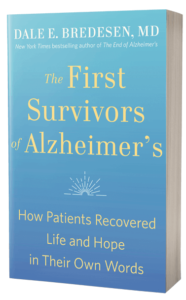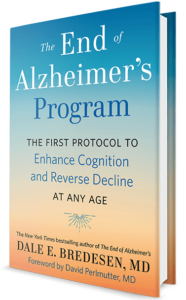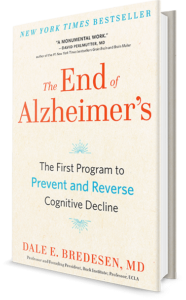What We Do
The mission of the APRP Foundation is to advance successful methods for researching, preventing, and reversing cognitive decline. We identify and address actual causes—not just symptoms—of Alzheimer’s disease, and improve outcomes for many patients in need.
The Alzheimer’s Misconception
At APRP, we believe the entire approach to treating Alzheimer’s has been based on a fundamental misconception: that Alzheimer’s is a simple disease—like pneumonia or tuberculosis—so we just need to find the cause, develop a drug, and write the prescription. This misunderstanding has caused the standard of care to be completely backwards.
We are told not to check our genetic susceptibility because nothing can be done. We are told that there is no effective treatment, and so we delay our evaluation and treatment. When we develop symptoms, the physician does not do the very tests that are critical for understanding what caused the symptoms and we are treated with ineffective drugs that do not target the cause(s) of the disease.
The Alzheimer’s Prevention and Reversal Project (APRP) advances evidence-based, personalized medicine to prevent, slow, and reverse neurodegenerative diseases. Through research, clinical application, and preventive care we are seeing a change from impossible to possible. There are now over 3000 patients on this protocol, with unprecedented improvements documented.
The Bredesen Protocol is based on over three decades of Dr. Bredesen’s laboratory research
Reversal of Cognitive Decline: 100 Patients1
A report of 100 patients, treated by several different physicians, with documented improvement in cognition, in some cases with documentation of improvement in electrophysiology or imaging, as well. This additional report provides further support for a randomized, controlled clinical trial of the protocol and the overall approach.
Reversal of Cognitive Decline in Alzheimer’s Disease2
The first description of the reversal of the cognitive decline in patients with early Alzheimer’s disease or its precursors, MCI (mild cognitive impairment) and SCI (subjective cognitive impairment).
Transcriptional Effects of ApoE4: Relevance to Alzheimer’s Disease3
Dr. Bredesen and team showed that ApoE4 acts as a transcription factor and binds to the promoters of genes involved in a range of processes linked to aging and Alzheimer’s disease pathogenesis. These findings point to novel therapeutic strategies for Alzheimer’s disease and aging, resulting in an extension of human healthspan, and a disease-free and functional period of life.
Dale E. Bredesen, M.D.
Dr. Bredesen graduated from Caltech and received his MD from Duke. He served as Resident and Chief Resident in Neurology at UCSF, then was a postdoctoral fellow with Nobel laureate Prof. Stanley Prusiner. He was the Founding President of the Buck Institute for Research on Aging.

Dr. Bredesen's Books
"Although the source of the quote 'The definition of insanity is doing the same thing over and over again and expecting a different result' has been questioned, its relevance to the pursuit of a single drug approach to Alzheimer’s disease is unquestionable. Sanity now prevails with Dr. Bredesen’s challenge to the status quo that may very well bring an end to Alzheimer’s disease."
— David Perlmutter, M.D.
#1 New York Times Best Selling Author, Grain Brain and Brain Maker




